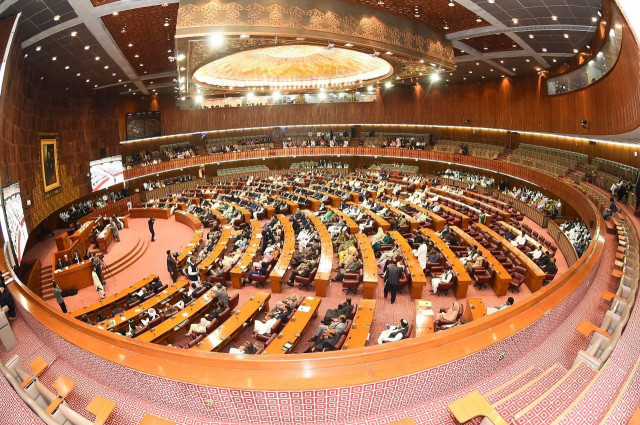NA passes bill to penalise contempt of parliament
Contemnor can be awarded 6-month jail term with Rs1 million fine

The National Assembly on Tuesday passed a private member’s bill aimed at criminalising the contempt of parliament with punishment of a six-month jail term and a fine of Rs1 million.
During the session, chaired by Speaker Raja Pervaiz Ashraf, dissident Pakistan Tehreek-e-Insaf (PTI) member and the house privileges committee chairman Rana Qasim Noon presented the bill, which was unanimously passed by the house.
Education Minister Rana Tanveer Hussain supported the bill. He said the Contempt of Parliament (Senate and National Assembly) Bill was a “very important piece of legislation”, adding that it would help improve the oversight role of parliament.
Noon told the house that the bill would ensure the writ of parliament. “Parliament has to be respected. The members were insulted inside and outside the house but now we will not accept insults from anyone,” he said.
Speaking after the passage of the bill, Noon stressed that it was a historic moment in the parliamentary history of the country. Similar legislation had been enacted by the four provinces but no such law existed at the federal level.
“This bill will ensure the supremacy of parliament – the mother of all institutions,” he said. “It will also ensure proper functioning of the standing committees and parliamentary oversight role would be become more effective,” he added.
The bill
The statement of objects and reasons of the bill said that it aimed at condemning and awarding punishment for the actions that account for breach of the sovereignty and integrity of the prestigious house of parliament in any form or shade.
“Whereas, the loyalty to State is the duty of every citizen under Article 5 of the Constitution and whereas, the Majlis-e-Shoora [Parliament] of Pakistan enjoys sovereignty to frame laws on the Federal subjects, the obedience to the Parliamentary oversight has to be given ultimate importance,” the statement explained.
It said that the parliamentary committees acted as extension of their respective houses and such committees not only give threadbare consideration to proposed legislation but also perform oversight functions, including conduct of public hearings.
It added that at times, the people did not appear before these committees despite notices which not only undermined the respect of the Majlis-e-Shoora but also hampered proceedings of such committees as well as redressal of public grievances.
“Entry 42 of the federal Legislative List of the Fourth Schedule of the Constitution empowers Majlis-e-Shoora to make laws for the punishment, by a house, of persons who refuse to give evidence or produce documents before a committee of a house, when duly required by the chairman of the committee to do so,” the statement continued.
“Therefore, there is a need to frame law providing for punitive measures against persons who are reluctant to comply with the directions of a house of the Majlis-e-Shoora or a committee thereof.”
The Contempt of Parliament Bill will apply to any person who violates the orders or instructions of the house or any committee of the house, breaching the privilege of a member, the house or a committee.
The new law will also apply to any person who makes a false statement before a committee or refuses to provide evidence or record, prevents a witness from giving evidence or statement before the committee by threats or force.
Contempt of Parliament Bill says that insulting parliament – the National Assembly and the Senate – and members of parliament will be a punishable offence, and if found guilty, the responsible person will be jailed for six months with a fine of Rs1 million.
Under the bill, an anti-contempt committee will be established, with the powers similar to that of a civil judge. The committee will have the power to issue summons and warrants over any breach of the privileges of parliament and its committees.
Under the Bill, the matter of insult by any institution or person will be placed before the privileges committee. Then the committee will submit its recommendations to the National Assembly and the Senate within 60 days.
On the recommendations of the committee, the matter will be referred to the anti-contempt committee, which will comprise five members – three from the National Assembly and two from the Senate.
The three members from the lower house of parliament will be nominated, one each, by the speaker, the prime minister and the leader of the opposition. The Senate members will be nominated by the leader of the house and the leader of the opposition.
The committee will have the authority to issue summons and warrant of arrest to any person for failing to appear before a house committee, with the approval of the National Assembly speaker or the Senate chairman.
The bill further states that the right to fair trial as enshrined in the Constitution will be provided, but no one will be allowed to appear before the committee through legal practitioner or an advocate.
If found guilty, the committee will award the punishment of jail term and fine. However, in case of punishment, the convicted person will have the right to file appeal before the Senate chairman or the National Assembly speaker within 30 days.
In case of an appeal, a two-member committee, consisting of the National Assembly speaker and the Senate chairman, will hear the appeal against the sentencing and take the final decision on it.
The bill states that the anti-contempt committee may hold the proceedings in camera, adding that its proceedings will be quasi-judicial proceedings while any document produced or evidence recorded will not be admissible as evidence in any court.
(WITH INPUT FROM APP)



















COMMENTS
Comments are moderated and generally will be posted if they are on-topic and not abusive.
For more information, please see our Comments FAQ